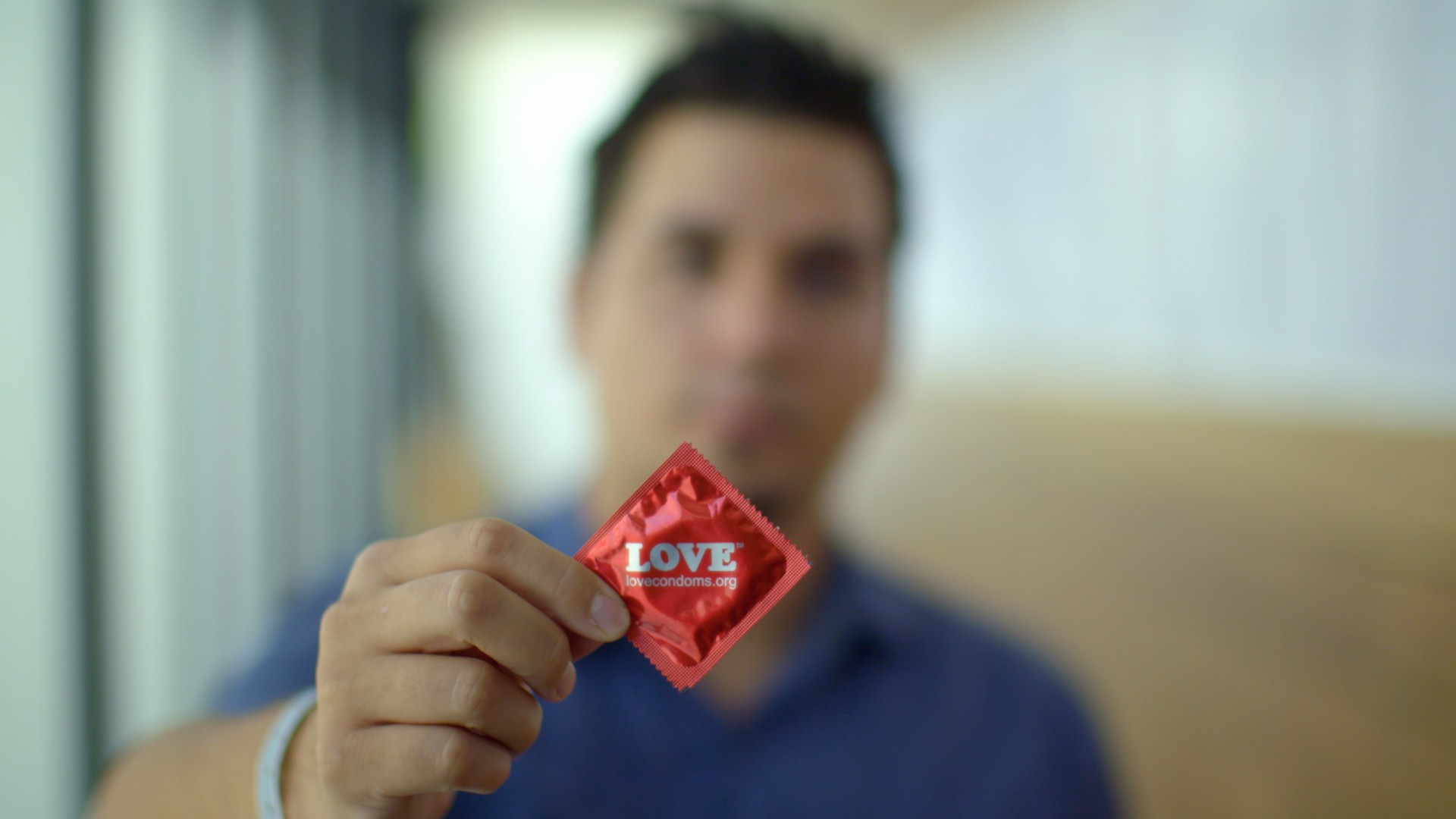A still from a video documenting a porn performer protest of Prop 60 on Los Angeles's Sunset Boulevard this October
Get the VICE App on iOS and AndroidIn the 25-plus years Brittany Andrews has been doing porn, she has never made a single film without condoms. Still, she sometimes gets surprised reactions on set."This guy completely freaked out on me because I used the company credit card to buy condoms," she says of one director not familiar with her brand. After a tirade on set, he checked with the film's producers, then came back with an apology."He said, 'Sorry about that—I've never seen anybody ever use a condom.'"Proposition 60, a California state ballot measure to clarify existing laws mandating condom use on adult film sets, aims to change that; in doing so, it could have deep ramifications for the porn industry (which is heavily concentrated in California). But first, it has to pass in this Tuesday's election—a likely fate the porn industry is working hard to prevent.In 2012, Los Angeles County passed Measure B, a law mandating condoms on all adult film sets within the county. Condoms had already been required by a seldom-enforced law since 1992, but a 2004 porn industry HIV outbreak aroused the interest of Michael Weinstein, president of the AIDS Healthcare Foundation (AHF), a nonprofit HIV/AIDS care and advocacy organization. The AHF began filing complaints against porn producers; after violations persisted, they drafted and sponsored Measure B. In the year that followed, the number of adult film shooting permits filed in the county plunged, and productions may have moved outside LA county or out of state.Prop 60, as this November's statewide ballot measure is called, would extend Measure B's mandate statewide. It would also require producers to pay for vaccinations, testing, and medical exams related to the prevention and treatment of sexually transmitted infections (STIs). Furthermore, the measure would allow private citizen viewers to report violations of the condom law to Cal/OSHA; if OSHA fails to act on a complaint within 21 days, those citizens would then be allowed to sue anyone with financial interest in the production, and see a 25 percent cut of penalties paid.Debate over the measure has raised questions about freedom of expression and the role of private citizens in enforcing occupational health regulations. But at the heart of the matter, say public health experts, is a basic right to be protected on the job.For years, porn producers argued that because performers were independent contractors, rather than employees, they were not protected by Cal/OSHA regulations. Although that argument was rejected by a California court, producers still routinely flout regulations, ignoring existing laws requiring condoms and refusing to pay for the semi-monthly testing the industry mandates, said Dr. Jeffrey Klausner, a Los Angeles physician who has served as an expert witness in several Cal/OSHA cases against producers.One reason for their reluctance might be the high demand for condomless sex—in a recent study, 65 percent of men preferred to watch porn without condoms. Andrews and others say producers feel putting condoms in porn will reduce their profits.Several political and public health organizations have endorsed Prop 60, but its only major financial backer is the AHF. Leading opposition to the measure is the Free Speech Coalition (FSC), a trade group representing porn producers; multiple HIV/AIDS organizations, LGBTQ rights advocacy groups, and political organizations have signed letters opposing the initiative.More than 40 newspapers have also published editorials declaring their opposition to Prop 60, citing concerns that the law would force the industry underground or out of state, or that deputizing citizens to enforce it is an extreme overreach.
Watch: Porn Prostitution
Occupational risks to adult film performers are high: HIV transmission on sets has been documented twice, most recently in 2014, and performers have extraordinarily high rates of STIs.Like all workers, the AHF argues, porn stars need protection from those risks. But that protection doesn't have to be condoms, say FSC representatives. PrEP—a daily pill taken to prevent HIV infection—could play a role in protecting performers from HIV, said Mike Stabile, an FSC spokesperson, and industry-required STI testing allows for early identification and treatment of other infections.A performer could certainly opt to take PrEP, but mandating it across the industry is impractical, said John Schwada, the communications director for the AHF. Furthermore, say occupational health experts, there is no precedent for requiring employees to take a drug as protection against an occupational hazard.Performers have been vociferously critical of required condom use on sets. Among commonly voiced concerns is the chafing and discomfort they say can accompany extended scenes involving penetration with condoms.Stabile says performers want the option to have condoms, but not a mandate requiring them. He said most performers "say, 'I feel safer on a [set where industry-mandated testing every two weeks is enforced] than a condom set. If I have to choose between the two, I'd choose testing.'"Across the porn industry, performers seem to be uniformly opposed to Prop 60. However, people familiar with the industry say the apparent groundswell of performer opposition is partly due to the threat of being barred from work or bullied for speaking publicly in favor of a condom requirement."It's almost impossible for someone in the porn industry to speak out in favor of condoms in porn without being both blacklisted and endlessly harassed by the rest of the industry," said a spokesperson for AntiPornography.org, a nonprofit organization that has collected testimonials from former porn industry workers, who wished to remain anonymous for fear of harassment.Andrews said many female performers have spoken to her privately about their preference for condoms on set. But out of fear of causing them career damage, she said, "I would never mention their names."Occupational health experts say labor laws exist precisely because employees and employers have unequal power—and the choices employees make under the threat of being fired, including choosing to express an opinion publicly, may not represent their own true preferences. For this reason, "employers have special responsibilities for preventing employee injuries and illnesses due to the employer's control of, and profit from, the performance of the work," wrote a former deputy chief of Cal/OSHA in a 2015 commentary on the issue.Stabile said another major concern about Prop 60 is its threat of lawsuits filed by private citizens against "anyone in the production chain" of adult films. Because so many performers are also producers, many feel this could result not only in financially crushing legal action, but also in the release of private information, enabling stalkers.Schwada noted that precedence exists for citizen suits in environmental laws, a number of which allow private citizens to pinch hit for the resource-strapped government to enforce their mandates. Matthew Shudtz, the executive director of the Center for Progressive Reform (CPR), agrees that not having a private right of action under the Occupational Safety and Health Act is "a major shortcoming," and CPR legal scholars have argued that a similar provision should be created for occupational health regulations.Furthermore, said Schwada, the same privacy rights would apply to accused parties whether a lawsuit is filed by a private party or a state agency. And as industry expert and blogger Mike South wrote in a post critical of Prop 60, the information that a private lawsuit would make available is no different than what producers must make public under US Code 2257, which requires adult film producers to keep two forms of identification on file at a physical address to prove minors were not involved.Schwada says many of the industry's arguments are a throwback to the days before labor laws. "Their business practices walk, talk, and smell like the ones that robber barons practiced in the 19th century: 'the hell with worker protections,'" he said."Other industries have to live with constraints," he said. "Why is this industry so damn special?"_Keren Landman is a practicing physician who specializes in infectious diseases and public health. Follow her on Twitter._
Advertisement
Advertisement
Advertisement
Watch: Porn Prostitution

Occupational risks to adult film performers are high: HIV transmission on sets has been documented twice, most recently in 2014, and performers have extraordinarily high rates of STIs.Like all workers, the AHF argues, porn stars need protection from those risks. But that protection doesn't have to be condoms, say FSC representatives. PrEP—a daily pill taken to prevent HIV infection—could play a role in protecting performers from HIV, said Mike Stabile, an FSC spokesperson, and industry-required STI testing allows for early identification and treatment of other infections.A performer could certainly opt to take PrEP, but mandating it across the industry is impractical, said John Schwada, the communications director for the AHF. Furthermore, say occupational health experts, there is no precedent for requiring employees to take a drug as protection against an occupational hazard.Performers have been vociferously critical of required condom use on sets. Among commonly voiced concerns is the chafing and discomfort they say can accompany extended scenes involving penetration with condoms.Stabile says performers want the option to have condoms, but not a mandate requiring them. He said most performers "say, 'I feel safer on a [set where industry-mandated testing every two weeks is enforced] than a condom set. If I have to choose between the two, I'd choose testing.'"
Advertisement
Advertisement
